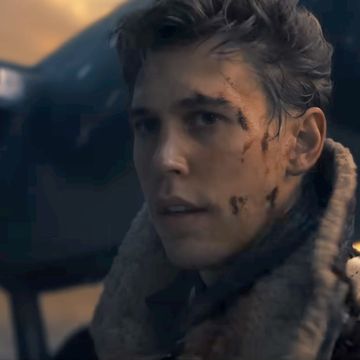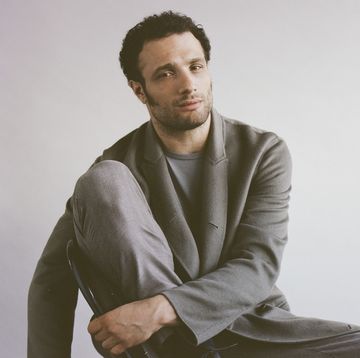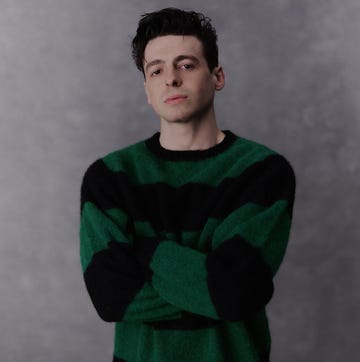Even in a TV era this spoiler-conscious and leak-phobic, Showtime's Twin Peaks revival has redefined what small-screen secrecy can look like. Its trailers have been simultaneously tantalizing and opaque, drawing you back into the early '90s world of David Lynch and Mark Frost's small-town psychodrama while revealing absolutely nothing in the way of plot, dialogue, or even new characters. When David Lynch made an appearance at the Television Critics Association press tour in January, he made a gloriously surreal art form out of dodging journalists' questions, making it through a 15-minute panel without giving away a single piece of actual information.
The project has been so shrouded that it's now hard to believe Twin Peaks: The Return is premiering for real this Sunday night, making good on the promise of murdered beauty Laura Palmer (Sheryl Lee), who in the original series finale told Agent Dale Cooper (Kyle McLachlan), "I will see you again in 25 years." That episode ended the show's run on ABC with the infamous "How's Annie?" twist, wherein it's revealed that Cooper's body is now possessed by the malevolent spirit known as BOB, leaving his spirit trapped in the hellish Black Lodge. Lynch and Frost did not intend this to be the ending of the show, and with The Return their long-abandoned plans for Season Three are finally coming to fruition—on premium cable rather than network.
The pair wrote the entire season together, and in a move that's near unheard of for television but obvious for an auteur, Lynch also directs all 18 episodes. Showtime execs have touted the show as "the pure heroin vision of David Lynch", which Frost was keen to modulate when I spoke to him last month. "I like to think it's a little bit more sunny than that–maybe more like a grown-up amusement park where people are gonna have the time of their lives."
I spoke to Frost about keeping the revival under wraps, how online theories worked back in the chat room era, and how BOB allowed Twin Peaks to tackle subject matter that would otherwise be off limits for network television.
Twin Peaks: The Return was born out of Lynch and Frost's abandoned blueprints for Season Three.
We retrieved those blueprints, blew the dust off them, and decided what made sense [to retain], given that 25 years had passed in the interim. We incorporated some of it, and proceeded to totally ignore the rest and go off in a new direction. We long ago made peace with whatever perceived issues there might have been with that second half of Season Two. It is what it is, it was what it was, and I think all of it in one way or another proved foundational for what we did moving forward.
Even in the early '90s, Twin Peaks sparked a Reddit-esque level of online theories.
I fully expect that the new show will actually break the internet, given the obsessive nature of people's interest in narrative storytelling now, and the proclivity to share it online. When Twin Peaks came around the first time, all of that was just beginning. It was still dial-up and modems, and I remember vividly at the start of Season Two someone coming in with a foot-high stack of papers that were just print-outs of internet chat rooms, where people were theorizing about the show. So I can only imagine what will happen now–they're gonna have to build whole new server cities out in the desert to handle the traffic! And I encourage that. I think the idea of participatory narratives gets at the heart of what storytelling is supposed to do for a culture. I say the more the merrier, and hopefully we've provided enough grist for the mill to keep that going for months and months, if not years.
Lynch and Frost approached The Return as a movie, and 18 episodes was the length they organically reached.
We wrote the series without any firm sense of how long it was going be–it was going to be the length it was when all the stories had reached what felt like their final destination. David has often described it as a long film with chapters, as opposed to episodes, which I think is a useful way to look at it. The limitations that network TV placed on you are completely gone, and you have total freedom to tell the story as you see fit.
Frost and Lynch often collaborate remotely, and the new series was written largely via Skype.
The first time around, we were writing the Twin Peaks pilot on this incredibly early piece of remote-working software, when David was in New York and I was in L.A. on a little 512K Mac. It was like Alexander Graham Bell discovering the telephone, the fact that I could sit there and type in L.A. and the words would show up on his screen in New York while we were talking on the phone–I remember David saying, "Holy cow!" It was like magic, so it makes sense that many years later, we're using something a little bit more sophisticated than a Dick Tracy Two-Way radio to write the story together. [Skype] also prevented me from inhaling second hand smoke for two years, so on a personal level it was beneficial to my health.
Before beginning work on the revival, Lynch and Frost made a pledge of secrecy.
The world is so beset with spoilers, and this obsession with "I want to find out what something's like before I experience it." Invariably, it diminishes the experience. I know there's a great curiosity to know what's coming, but I think it's more enjoyable for people to not know what's coming. Let's have an experience that you haven't already had a chance to pre-judge, or digest, and have something that's completely new. I know David feels exactly the same way, so that was the pledge that we undertook from the beginning–let's make secrecy here a priority, and give people something that they literally have never seen before.
BOB, depending on your interpretation, is either a literal demon that possesses people and forces them to do evil, or a metaphor for years of abuse within the Palmer family. That ambiguity was critical to Twin Peaks in its ABC days, and will remain so even in the less sensitive cable environment.
What we were really talking about in the old show was a horrific crime that took place within a very damaged family, and we did it in a way that had elements of dark poetry and metaphor and mythology. The Greeks were obsessed with themes like this, and they did it through invoking gods and taking you to other realms, and even when you think about the real nature of fairy tales, this has been done through the ages of storytelling. By not making it simply a documentary of a wretched series of events inside a tormented family, you're able to talk about themes that certainly for network television might have seemed far too dangerous.
We also have never really wanted to narrow down viewers' choices of interpretation. People can see BOB however they want, and one of the things we explicitly stated at one point in the old show was that maybe it was just a way of putting a terrible story into a form that we could cope with, or maybe it was something real. We've always decided it's best to let viewers make up their own minds about that stuff, and that's very much the case moving forward as well.














